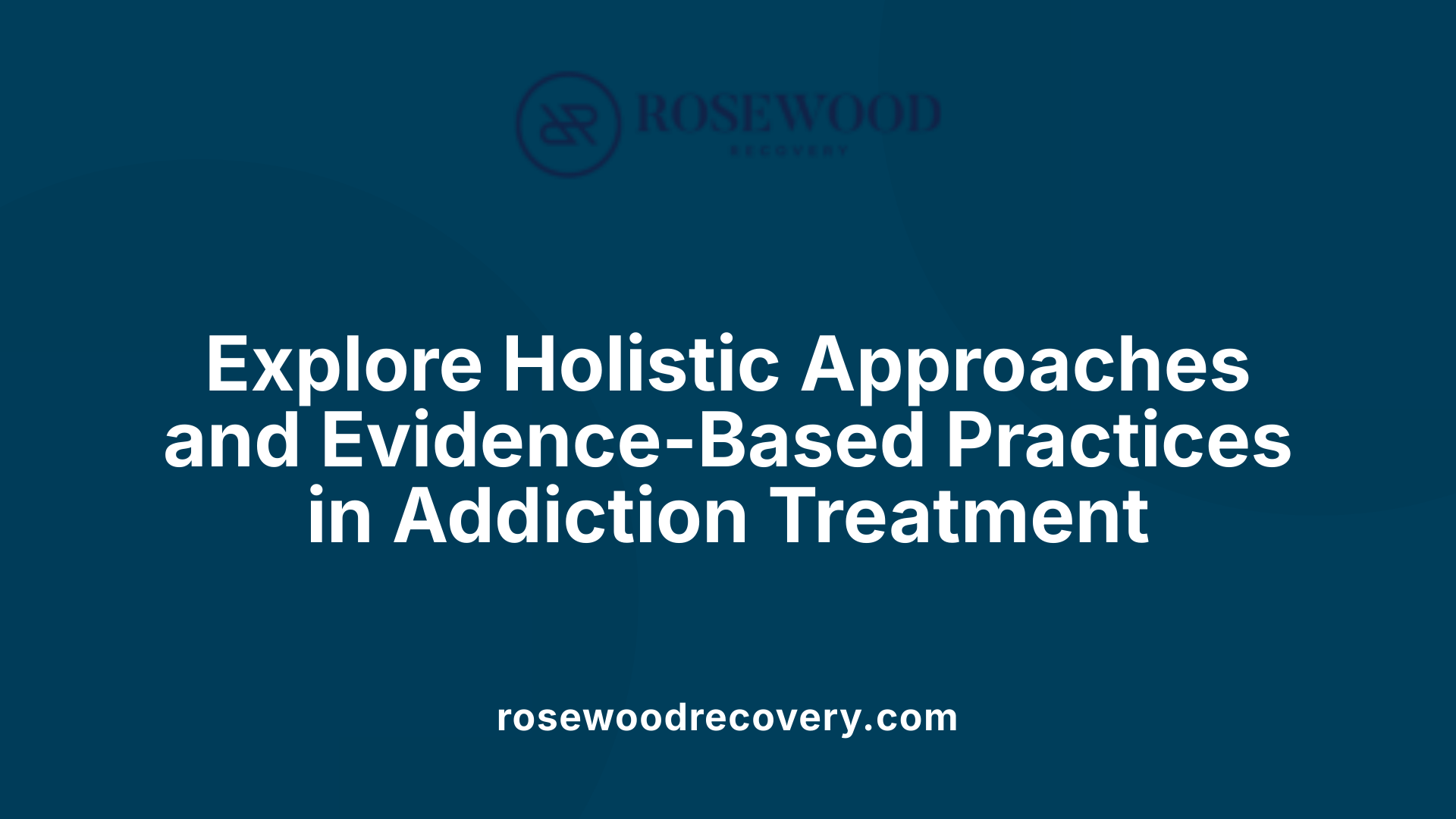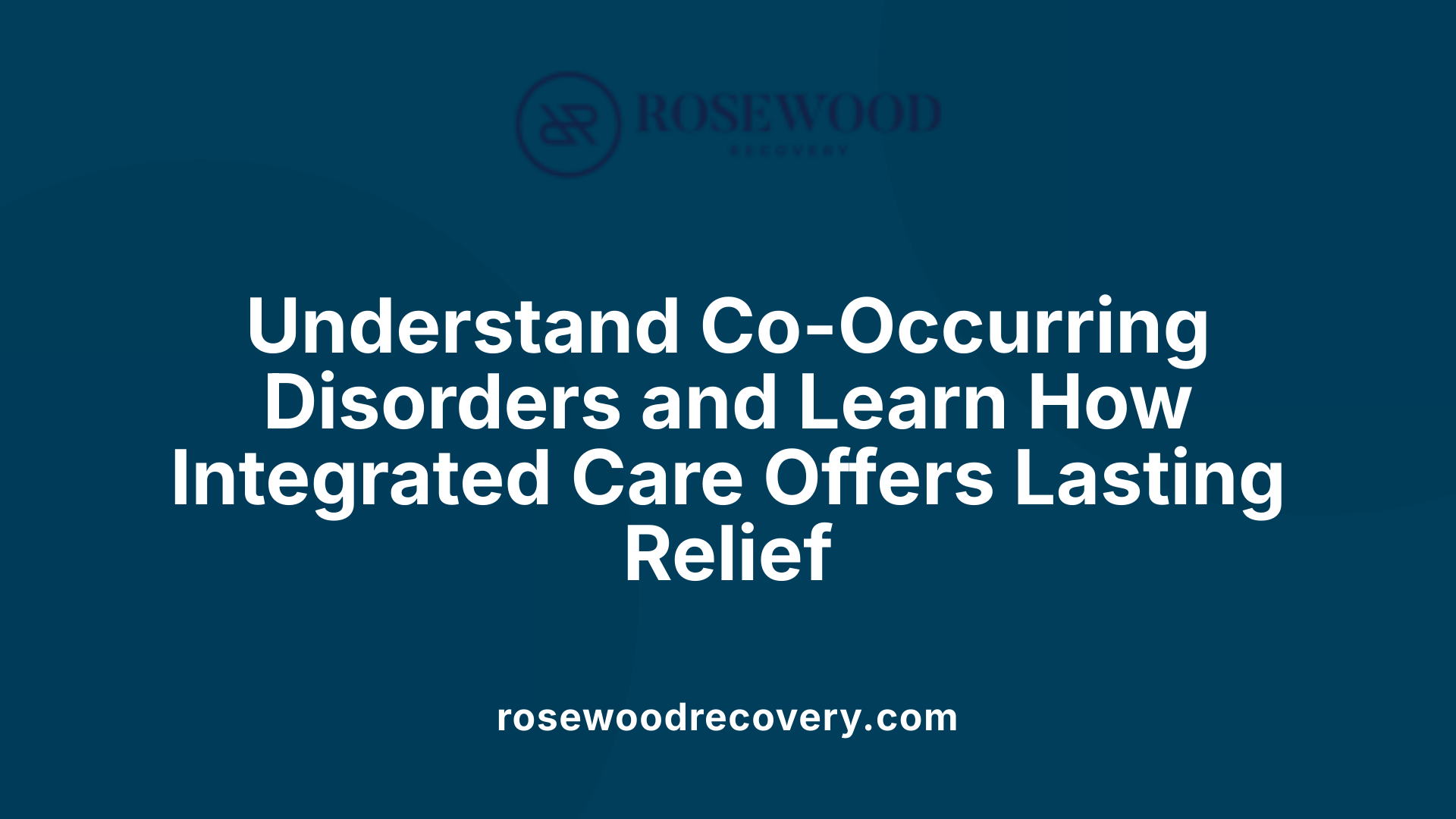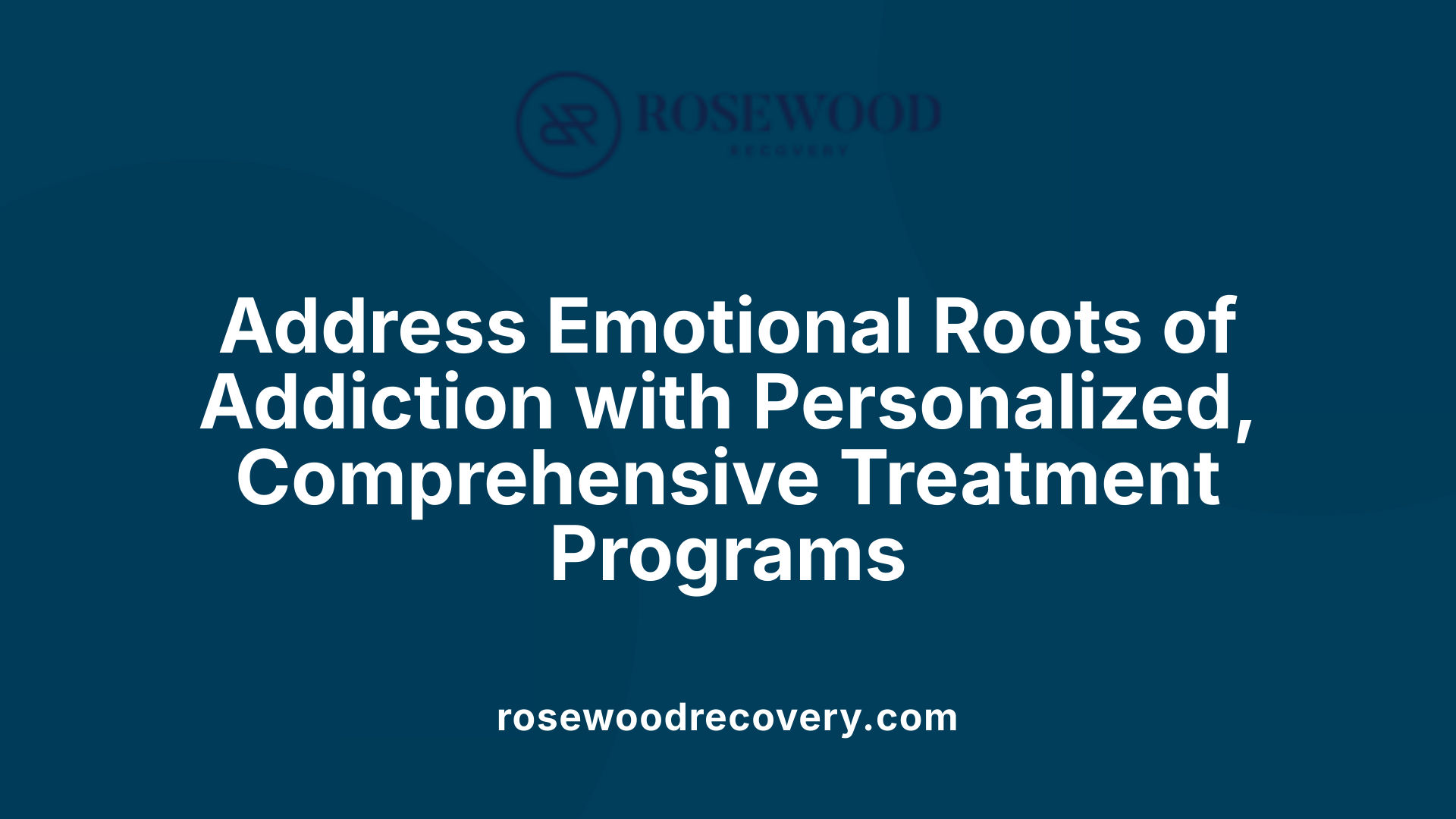Understanding Emotional Pain and Its Connection to Addiction
Emotional pain often drives individuals toward substance use as a way to numb or escape distressing feelings. However, relying on alcohol, drugs, or other addictive behaviors only deepens the struggle, leading to complex co-occurring disorders and a challenging cycle of self-medication and addiction. This article explores comprehensive strategies for releasing emotional pain without resorting to substances, highlighting effective treatment methods, behavioral therapies, and supportive tools that foster lifelong recovery and emotional well-being.
What Are Comprehensive Treatment Services for Substance Abuse and Addiction?

Components of comprehensive treatment services
Comprehensive treatment services for substance abuse and addiction encompass a wide range of interventions designed to address the complex needs of individuals. These include medically supervised detoxification, behavioral therapies, counseling, and rehabilitation programs. Treatment often addresses medical, mental, social, occupational, family, and legal needs to support holistic recovery.
Integration of mental health and addiction care
Integration is critical in treating co-occurring disorders, combining mental health and substance use treatments into a unified plan. This approach utilizes behavioral therapies and medications targeting both addiction and mental health conditions simultaneously for improved outcomes.
Medication-assisted treatments
Medications such as methadone and buprenorphine are frontline treatments for opioid use disorder. Other medications help treat alcohol and nicotine addiction, often paired with behavioral therapies to manage withdrawal symptoms and support long-term recovery.
Specialized services for diverse patient populations
Facilities offer tailored services for pregnant women, trauma survivors, and individuals with co-occurring disorders. Programs may include inpatient and outpatient care, crisis stabilization, and family therapy to address specific challenges faced by different groups.
Evidence-based approaches and accreditation
Treatment programs follow evidence-based practices like cognitive-behavioral therapy (CBT), dialectical behavior therapy (DBT), and motivational interviewing (MI). Accreditation by organizations like SAMHSA ensures standards for quality care and accessibility regardless of a patient's financial status.
Support resources and crisis interventions
Support extends beyond treatment centers, including national helplines such as the 988 Suicide & Crisis Lifeline and 24/7 National Helpline. Prevention campaigns and recovery resources like the RecoverMe campaign further provide education, early intervention, and sustained support for addiction and mental health challenges.
The Intersection of Mental Health and Substance Abuse in Emotional Pain Management

How do mental health issues intersect with substance abuse and addiction treatment?
Mental health disorders and substance use disorders often coexist, a phenomenon known as co-occurrence. This is driven by shared risk factors such as trauma, genetics, and environmental conditions. For example, individuals suffering from depression or anxiety might use substances as a way to self-medicate, which can worsen both conditions.
The overlap complicates treatment since symptoms can be intertwined, requiring an integrated approach. This means addressing both the mental health and substance use disorders simultaneously rather than in isolation. Accurate diagnosis by healthcare professionals experienced in both areas is critical to tailor the right interventions.
Why are integrated treatment approaches necessary?
Integrated care combines behavioral therapies, medications, and case management into one coordinated plan. Behavioral therapies like cognitive behavioral therapy (CBT), motivational interviewing, and family-based interventions help individuals modify destructive behaviors and manage triggers. Medications can address addiction symptoms and mental health issues such as depression or anxiety.
Such comprehensive treatment supports the whole person, improving outcomes by addressing medical, psychological, social, and occupational needs.
What role do shared risk factors like trauma, genetics, and environment play?
Trauma is a significant risk factor, as many turn to substances to numb emotional pain or traumatic memories. Genetics can predispose individuals to both addiction and mental health challenges. Environmental influences, including stress, peer pressure, and availability of substances, further increase vulnerability.
Understanding these connections helps guide targeted therapies, like trauma-focused treatments and resilience-building strategies.
The synergy of these factors underscores the importance of holistic and integrated care for sustained recovery and emotional pain management.
Understanding Addiction Types Addressed in Treatment and Their Emotional Roots

What forms of addiction are typically addressed in comprehensive treatment programs?
Comprehensive addiction treatment programs tackle a broad spectrum of substance use disorders and behavioral addictions. Substance addictions include alcohol, opioids, stimulants, hallucinogens, cannabis, inhalants, and misuse of prescription medications. On the behavioral side, addictions such as gambling, shopping, gaming, internet, and social media usage are also addressed.
Treatment modalities often combine medication-assisted treatment (MAT) for substance addictions with behavioral therapies. Common behavioral approaches include cognitive-behavioral therapy (CBT), contingency management, motivational enhancement therapy, and 12-step facilitation. These evidence-based methods focus on modifying behaviors and attitudes, coping with triggers, and preventing relapse.
Holistic and integrative therapies—such as art therapy, music therapy, yoga, mindfulness practices, and biofeedback—support emotional and psychological healing. Recognizing addiction as a chronic brain disorder, treatment plans are personalized to cover an individual's medical, mental health, social, occupational, family, and legal needs.
By addressing the whole person and accounting for addiction's complex emotional roots, these programs promote sustainable recovery, helping individuals manage addiction long-term and improve overall quality of life.
| Addiction Type | Treatment Approaches | Involved Therapies and Supports |
|---|---|---|
| Substance Use Disorders | Medication-assisted treatment, behavioral therapy | CBT, motivational interviewing, withdrawal management |
| Behavioral Addictions | Behavioral therapies, support groups | Contingency management, 12-step programs, family therapy |
| Holistic Supports | Integrative therapies | Art, music, yoga, mindfulness, biofeedback |
| Comprehensive Care | Multidisciplinary and personalized treatment plans | Addressing medical, mental, social, occupational, and legal needs |
Healthy Coping Strategies to Release Emotional Pain Without Substances
Replacing Harmful Self-Medicating Behaviors
Many individuals turn to substances like alcohol or drugs to cope with emotional pain, which can worsen mental health problems over time. Replacing these harmful behaviors with healthier coping mechanisms is essential for long-term wellbeing.
Social Support Systems
Connecting with supportive people such as friends, family, online communities, sponsors, or peer recovery specialists provides a safe space to share feelings and receive encouragement during difficult times.
Physical Activity and Movement
Engaging in regular physical activity—walking, dancing, going to the gym—not only promotes physical health but also helps regulate emotions like anger, reduces anxiety, and improves mood.
Relaxation and Meditation Techniques
Practices like meditation foster mental clarity and emotional calm by encouraging focused attention and awareness. Techniques such as the RAIN method and grounding skills using the five senses can help distract from overwhelming feelings.
Nutrition and Sleep Hygiene
Maintaining a healthy diet and good sleep habits supports brain function and emotional stability, improving the body's ability to manage stress and recover from emotional distress.
Self-Care Activities and Creative Pursuits
Engaging in activities such as listening to music, creative arts, or simply resting can promote emotional regulation and overall well-being without relying on substances.
Skills from Dialectical Behavior Therapy (DBT) and Grounding Techniques
DBT strategies help individuals acknowledge and regulate strong emotions. These can be practiced even without a therapist, using mindfulness, emotional regulation skills, and grounding exercises that focus on the present moment to reduce distress.
By consistently applying these coping strategies, individuals can effectively manage emotional pain and reduce reliance on substances, supporting healthier mental health outcomes.
Behavioral Therapies and Integrated Approaches for Sustainable Recovery
What role do behavioral therapies play in addiction treatment?
Behavioral therapies are indispensable in addiction treatment as they help individuals change harmful attitudes and behaviors related to substance use. They assist people in coping with triggers and preventing relapse by teaching practical skills and strategies tailored to personal challenges.
How do Cognitive Behavioral Therapy (CBT) and Dialectical Behavior Therapy (DBT) support recovery?
CBT focuses on identifying and modifying negative thought patterns and behaviors that contribute to addiction. DBT, a form of talk therapy, adds skills for emotional regulation and mindfulness, enabling individuals to better handle strong emotions without resorting to substances. For example, DBT teaches awareness and acceptance, even outside therapy sessions.
What family-based and trauma-focused therapies are effective?
Family-based approaches such as Multisystemic Therapy and Functional Family Therapy address family dynamics and environmental factors influencing addiction. Trauma-focused therapies like Eye Movement Desensitization and Reprocessing (EMDR) and Trauma-Focused Cognitive Behavioral Therapy (TF-CBT) help process painful memories and reduce trauma-related triggers for substance use.
How is treatment integrated for co-occurring mental health and substance use disorders?
Integrated treatment combines mental health and addiction care into one coordinated plan. This includes behavioral therapies like CBT and motivational interviewing alongside medication-assisted treatment, which uses medications to ease withdrawal and reduce cravings while therapy addresses behavioral and emotional needs.
What is the importance of medication-assisted treatment combined with therapy?
Medication-assisted treatment (MAT) is a first-line approach for opioid addiction and is also used for alcohol and nicotine dependence. When paired with behavioral therapies, MAT improves treatment outcomes by addressing both physical dependence and behavioral factors, supporting sustainable recovery.
How do community support and peer groups contribute to recovery?
Community and peer support groups, such as Alcoholics Anonymous (AA) and Narcotics Anonymous (NA), provide vital encouragement, shared understanding, and accountability. These groups help individuals build a supportive network that fosters long-term recovery and emotional resilience.
Overall, sustainable recovery is best achieved through comprehensive behavioral therapies, integrated care for co-occurring disorders, medication assistance, and strong community support systems.
Recognizing and Overcoming Self-Medicating Patterns

What is Self-Medicating and What Are Its Risks?
Self-medicating involves using substances such as alcohol, recreational drugs, prescription medications, food, or nicotine to relieve mental health symptoms or unpleasant emotions. Although it may provide short-term relief, self-medicating often worsens problems over time by increasing the risk of addiction and causing additional health complications.
What Are the Common Signs of Self-Medicating Behaviors?
Signs to watch for include:
- Turning to substances when feeling stressed, anxious, or depressed
- Feeling worse after using substances
- Needing increasingly larger amounts to feel relief
- Experiencing multiple problems in life that multiply alongside substance use
- Worrying about access to substances and facing concern from friends or family members
How Does Self-Medicating Impact Mental and Physical Health?
Self-medicating can exacerbate mood disorders and other mental health issues. It often damages personal relationships and creates barriers to seeking appropriate professional care. Physically, it can lead to serious complications and contribute to the development of addiction.
Can Self-Medicating Affect Other Medications?
Yes, self-medicating can interact negatively with prescribed medications, potentially diminishing their effectiveness and sometimes triggering new mental health problems like depression or psychosis, especially with heavy alcohol or drug use.
Why Is Honest Self-Assessment Important?
Recognizing patterns of self-medication requires honest self-reflection. Keeping a record of triggers, substance use, and emotional states helps individuals identify harmful behaviors and better understand their needs.
When Should One Seek Professional Help and Support?
If self-medicating leads to substance abuse or worsens mental health symptoms, comprehensive treatment is essential. This may include detoxification, therapy, support groups, and medical care. Supportive communication from loved ones and professional guidance improve recovery chances and overall well-being.
Building a Supportive Environment for Emotional and Addiction Recovery
How can non-judgmental communication support loved ones?
When supporting someone facing addiction or emotional struggles, non-judgmental communication is vital. It creates a safe space where individuals feel understood rather than criticized, reducing shame and encouraging openness. Approaching conversations with empathy helps loved ones feel valued and more willing to share their challenges.
Why is encouraging professional help and setting boundaries important?
Encouragement to seek professional help connects individuals with essential resources like therapy, medication, or specialist support. Setting healthy boundaries protects both the supporter and the individual by defining acceptable behaviors and avoiding enabling harmful patterns. This balance fosters long-term recovery and wellbeing.
What are the benefits of peer support, sponsors, and helplines?
Peer support and sponsors offer shared understanding from those who have faced similar issues, boosting motivation and hope. Helplines like SAMHSA’s 988 Suicide & Crisis Lifeline provide immediate, confidential assistance, making help accessible anytime. These networks reduce isolation and guide individuals through recovery steps.
How do community campaigns like RecoverMe contribute?
Campaigns such as SAMHSA’s RecoverMe connect young adults with tailored resources for substance use and mental health challenges. By raising awareness and normalizing help-seeking behavior, these initiatives enhance community engagement and facilitate early support.
Why is prevention and early intervention essential?
Prevention programs, including Substance Use & Misuse Prevention Month, focus on stopping substance use before it starts or progresses. Early intervention reduces the severity of addiction and mental health conditions, improving outcomes and lessening long-term impacts.
This combined approach—empathic communication, professional guidance, peer and community support, and proactive prevention—builds a nurturing environment crucial for sustained emotional and addiction recovery.
The Path Forward: Healing Emotional Pain Without Substances
Releasing emotional pain without resorting to substance use is a vital step toward lasting recovery and mental wellness. Comprehensive treatment services that integrate addiction care with mental health therapies provide the foundation for healing on multiple levels. Embracing healthy coping strategies, engaging in behavioral therapies, and building strong support networks empower individuals to manage emotional distress constructively. Recognizing self-medicating behaviors early and seeking integrated professional treatment can prevent the deepening of addiction and mental health challenges. As awareness grows and resources expand, more people can find hope and practical pathways to reclaim their emotional health and lead fulfilling, substance-free lives.
References
- Home | SAMHSA - Substance Abuse and Mental Health ...
- Treatment and Recovery | National Institute on Drug Abuse
- How to Stop Self-Medicating Depression, Anxiety, and Stress
- Finding Help for Co-Occurring Substance Use and Mental ...
- The Role of Emotions in Recovery and Treatment
- How can I manage my emotions without drugs or alcohol?
- Understanding Addiction: Truth, Treatment, and Hope
- Healing from Trauma & Addiction: How Therapy Breaks ...
- Home | SAMHSA - Substance Abuse and Mental Health ...
- Treatment and Recovery | National Institute on Drug Abuse




